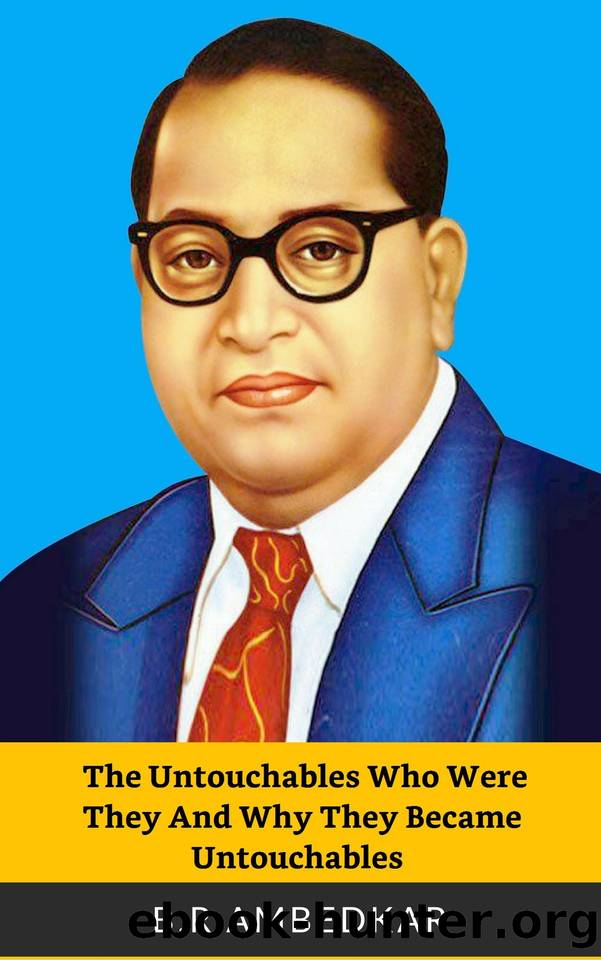The Untouchables Who Were They And Why They Became Untouchables ? by Ambedkar B.R. & Ambedkar B.R

Author:Ambedkar, B.R. & Ambedkar, B.R. [Ambedkar, B.R.]
Language: eng
Format: epub
Published: 2018-01-18T00:00:00+00:00
CHAPTER VI
HOW DID SEPARATE SETTLEMENTS FOR BROKEN MEN DISAPPEAR ELSEWHERE ?
THAT the Fuidhirs of Ireland and the Alltudes of Wales were Broken Men is true. That they lived in separate quarters is also a fact. But it is also true that the separate quarters of those Broken Men disappeared and they became part of the Settled tribe and were absorbed in it. This is somewhat strange. The Broken Men according to the theory set out before were given quarters outside the village because they belonged to a different tribe and, therefore, to different blood. How is it then that they were absorbed by the tribe later on? Why such a thing did not happen in India? These are questions which are natural and which call for an answer. The question is integrally connected with the process of evolution through which Primitive Society came to be transferred into Modern Society.
As has already been said this evolution has proceeded along two different lines. One marked the transformation of Primitive Society from Nomadic into a settled community. The other marked the transformation of Primitive Society from tribal into a territorial community. The question with which we are immediately concerned relates to the second line of evolution. For it is the substitution of common territory for common blood as the bond of union that is responsible for the disappearance of the separate quarters of the Broken Men. Why did Primitive Society substitute common territory for common blood as the bond of union? This is a question for which there is no adequate explanation. The origin of the change is very-obscure. How the change was brought about is however quite clear.
At some stage there came into being in Primitive Society a rule whereby a non-tribesman could become a member of the tribe and become absorbed in it as a kindred. It was known as a rule of ennoblement. This rule was that if a non-tribesman lived next to the tribe or married within a tribe for a given number of generations he became their kindred Mr. Seebhom gives the following rules for a non-tribesman becoming a tribesman as it was found in the Welsh village system.
(1) Residence in Cymru (Wales) according to the tradition of South Wales made the descendant of a stranger at last, a Cymru, but not until continued to the ninth generation.
(2) Intermarriage with innate Cymraeses generation after generation made the descendent of a stranger an innate Cymru in the fourth generation. In other -words, the original stranger's great grandson, whose blood was at least seven-eighths Cymric was allowed to attain the right to claim the privileges of a tribesman.
Should not such a thing have happened in India? It could have-indeed it should have. For a rule similar to that which existed in Ireland and Wales also existed in India . It is referred to by Manu. In Chapter X, verses 64-67, he says that a Shudra can be a Brahmin for seven generations (if he marries) within the Brahmin Community. The ordinary rule of Chaturvarna was that a Shudra could never become a Brahmin.
Download
This site does not store any files on its server. We only index and link to content provided by other sites. Please contact the content providers to delete copyright contents if any and email us, we'll remove relevant links or contents immediately.
Patriot by Alexei Navalny(366)
Museum of Antiquity by T. L. (Thomas Louis) Haines(308)
The Story of Joan of Arc by Andrew Lang(292)
2,2-Dimethyl-3,4-dihydro-2H-1,4-benzoxazines as isosteres of 2,2-dimethylchromans acting as inhibitors of insulin release and vascular smooth muscle relaxants by Bernard Pirotte & Xavier Florence & Eric Goffin & Philippe Lebrun(291)
The Apollo Moon Missions by Randy Walsh(281)
Richard III and the Princes in the Tower by A.J. Pollard(270)
The Memoirs of Pere Labat, 1693-1705 by Jean Baptiste(259)
Fry The Brain: The Art of Urban Sniping and its Role in Modern Guerrilla Warfare by John West(224)
A History of the Peninsular War, Vol. 5, Oct. 1811-Aug. 31, 1812 by Charles Oman(206)
Life of Napoleon Bonaparte, Volume I. by Walter Scott(206)
The Memoirs of Count Grammont â Complete by Hamilton Anthony Count Walter Scott(205)
1916 - The Battle of the Five Empires: 15 May - 28 September 1916 by Benoît Chenu(194)
Maleficium: Witchcraft and Witch Hunting in the West by Gordon Napier(194)
Rasputin the Rascal Monk by William Le Queux(186)
Famous Fights of Indian Native Regiments by Reginald Hodder(184)
BY MARK Twain, Twain - The innocents at home by 1881(182)
Father Browne's Titanic Album by E. E. O'Donnell(179)
The Thoughts of Marcus Aurelius by Marcus Aurelius(173)
Joanna of Flanders by Julie Sarpy(166)
